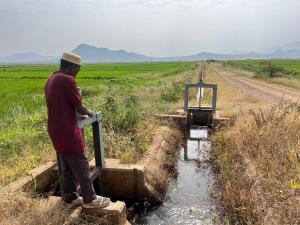Test project Pesticides and Protection Tanzania
testing out building a project
Omar Pérez: Submarine Roots, Resisting (un)natural disasters
omarperezI am interested in seeing how social ties and networks have been used to cope with (un)natural disasters. My research focus on places under disasters conditions such as Puerto Rico after hurricane Maria, in which social ties have made the difference between life and death. Furthermore, “natural” disaster has been used to approved austerity measures and unjust policies to impoverished communities like in New Orleans after Katrina. These policies were not new, as they are rooted in structures of power to preserve the status quo. Yet, people have resisted, “through a network of branches, cultures, and geographies” that has stimulated a reflective process of looking within for solutions rather than outside. As often this outside solutions are not only detached from community’s reality but can perpetuate social injustices and inequalities.
McKittrick, K., & Woods, C. A. (Eds.). (2007). Black geographies and the politics of place. South End Press.
Bullard, R. D., & Wright, B. (Eds.). (2009). Race, place, and environmental justice after Hurricane Katrina: Struggles to reclaim, rebuild, and revitalize New Orleans and the Gulf Coast. Westview Press.
Environmental Justice framing implications in the EIS

The Environmental Impact Statement (EIS) is a document required by the National Environmental Policy Act
Annotated Bibliography (EIS)
This link complements the Essay Bibliography of the Project Environmental Justice framing implications in the EIS.
Environmental Justice Framing Implications in the EIS. Essay Bibliography
This is the PECE essay bibliography for:
EPA Database on EISs
This (EIS) database provides information about EISs provided by federal agencies, and EPA's comments concerning the EIS process.
pece_annotation_1477282420
seanw146Dr. Emily Goldmann graduated from the University of Michigan with her PhD in Epidemiology and Columbia University with a Bachelor’s in economics and Chinese. Dr. Goldmann is currently a clinical assistant Professor of Global Public Health at New York University. “I am currently on the faculty of NYU's College of Global Public Health, in the Division of Social Epidemiology. My current research focuses on the intersection between physical and mental health in older adults, specifically trajectories of depressive symptoms following stroke. I also have a strong interest in the characterization, prevention, and treatment of mental illness in low-resource settings globally. I currently teach a master's level course in global mental health and an introductory course in epidemiology to undergraduate students.” (LinkedIn profile)
Dr. Sandro Galea graduated from University of Toronto with his MD, Harvard with a MPH, and Columbia with a DPH. Dr. Galea works as a physician and epidemiologist at Boston University School of Public Health. “In his scholarship, Dr Galea is centrally interested in the social production of health of urban populations, with a focus on the causes of brain disorders, particularly common mood-anxiety disorders and substance abuse. He has long had a particular interest in the consequences of mass trauma and conflict worldwide, including as a result of the September 11 attacks, Hurricane Katrina, conflicts in sub-Saharan Africa, and the American wars in Iraq and Afghanistan. ” (Boston University Biography)
pece_annotation_1478469210
seanw146The bibliography is not included in the excerpt that we received. Based on the text it appears that many other research articles and outside studies were used as well as interviews.



the rice irrigation scheme, Pare Valley, Tanzania